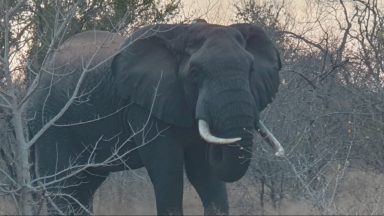This is a key moment in any translocation. After months of planning and long hours setting up, everyone is on edge, so the operation starts with the team joined together in prayer.
Cross-border collaborations such as these translocations are an outstanding example of how African countries are working together to solve conservation problems and grow the eco-tourism sector.
The 2 million hectare world-renowned Kruger National Park, around the size of Israel, managed by South African National Parks, offers a wildlife experience that ranks with the best in Africa. With more than 147 mammal species thriving in abundant numbers as a result of many years of expert conservation management and protection strategies, the park is well positioned to support the restoration of decimated protected areas in other southern African countries. Translocating zebra and wildebeest from the Kruger National Park to the Zinave National Park in Mozambique shows how South Africa’s conservation success is contributing to the rewilding of Africa.
Under the guidance of South African National Parks’ Veterinary Wildlife Services, Lourens de Lange briefs the translocation team on the morning of the capture. It takes a whole team to make a successful translocation. Alongside all the experts such as planners, wildlife veterinarians, drivers and innumerable others, there is also the camera crew, the photographers and filmmakers. Recording these operations is important for Peace Parks Foundation, not simply as a record but also as a way to fundraise too. Funding is essential to execute each translocation operation, and also to take care of the animals once they reach their new home.
Getting everyone in place and ready to act when required is a mammoth task. Everyone needs to know the call signals of the helicopter, how to stay out of sight of the animals, to be quiet, switch off all mobile phones, to know exactly when to draw the curtains across the cables, and how to stay safe in an unpredictable situation involving wild animals that are going to be frightened when the helicopter starts to herd them towards the capture site.
Talk to anyone in the crew and they all say the same thing. It is a privilege to be part of such an operation and everyone is keen to play their part, however small, in the greater picture of rewilding Africa.
Peace Parks Foundation has been translocating animals since 2010. Since then, Peace Parks has moved animals into many protected areas, from countries such as South Africa into countries such as Mozambique (areas such as Maputo Special Reserve and Simalaha Community Conservancy to name but two) and is witness to silent, unbalanced ecosystems transforming into healthy, thriving ones.
If you would like to help rewild Africa and be part of the Peace Parks’ mission, you can donate here: www.peaceparks.org/donate.
Remember, it’s not just a gift. You will be making a meaningful difference and impacting the course of conservation history.

